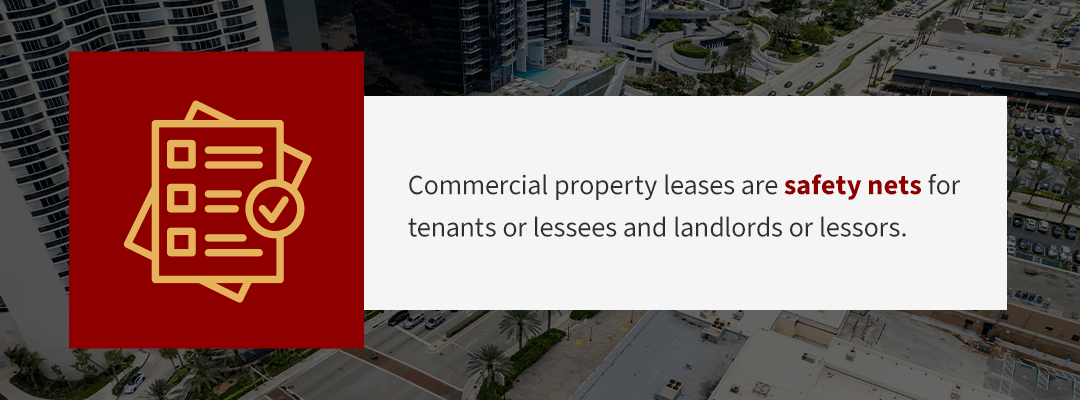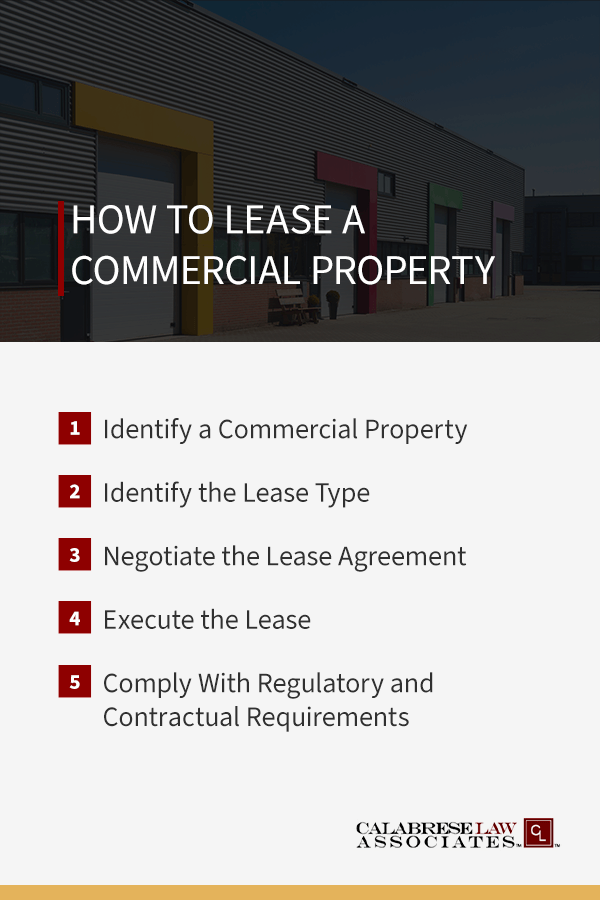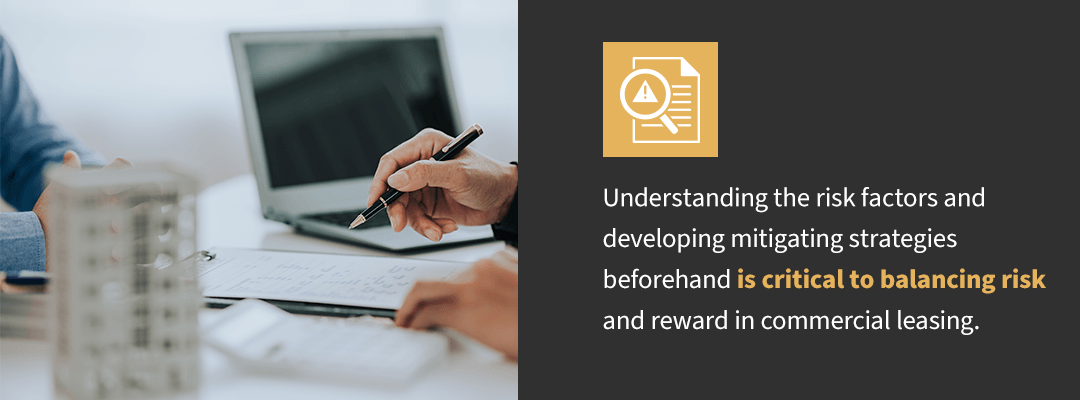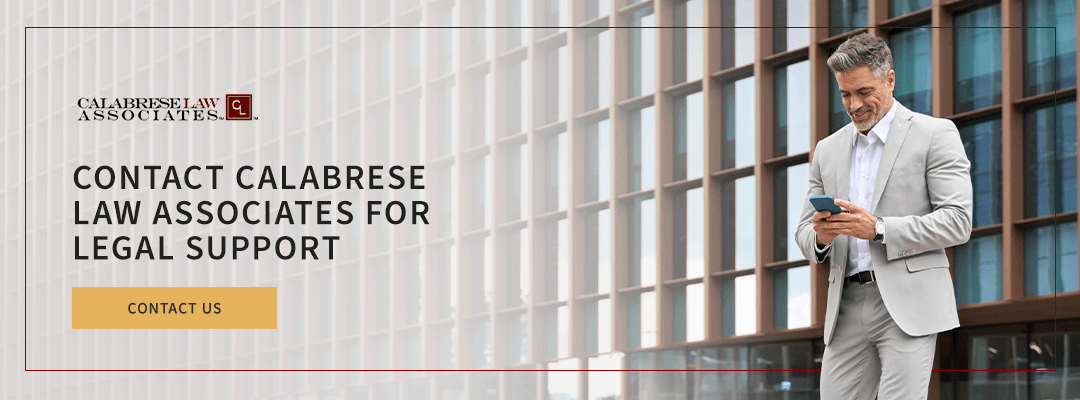Understanding commercial property leasing is essential for business owners. This guide explores the various types of commercial property leases and delves into the financial and legal considerations. It also discusses the process of leasing commercial properties, negotiation strategies, common challenges, and how to avoid them.
The real estate attorneys at Calabrese Law Associates help individuals and businesses execute commercial property leases. We also represent parties during litigation and help them achieve practical results. Read on to learn more.
What Is a Lease?
A lease is a legal contract that allows a party the right to use and occupy property for a certain length of time in exchange for payment. Leases and rentals are often used interchangeably, but there is a difference. Leases are usually long-term arrangements, whereas rentals are short-term. When it comes to commercial property, the relevant parties in leases are typically referred to as lessors and lessees, and landlords and tenants are often parties in rental agreements.
What Is Commercial Property Leasing?
Commercial property leasing means renting or leasing real estate for business purposes. Examples of commercial properties are:
- Office buildings: These are spaces for administrative, professional, and corporate activities.
- Retail spaces: These are locations for selling goods and services, like stores and shopping centers.
- Industrial properties: These are facilities for manufacturing, warehousing, and distribution.
- Mixed-use developments: These properties combine residential, commercial, and sometimes industrial uses in one space.
There are various aspects of commercial property leasing, including financial and legal considerations. It is crucial to learn the different components to protect your interests. Professionals like the real estate attorneys at Calabrese Law Associates can review, draft, negotiate contracts, and perform legal due diligence to mitigate associated risks.
Types of Commercial Property Leases
There are different types of commercial property leases, including the following:
1. Gross Leases
In a gross lease, the landlord or lessor covers all operating expenses associated with the property, including property taxes, insurance, and maintenance costs. The tenant or lessee typically pays a fixed rent amount without additional expenses. This arrangement is ideal for tenants who prefer predictable monthly costs, but the base rent is usually higher.
2. Net Leases
A net lease requires the tenant or lessee to pay a portion of the operating costs in addition to the base rent. There are three types — single, double, and triple:
- Single net leases: The tenant or lessee pays base rent plus property taxes.
- Double net leases: The tenant or lessee pays base rent plus property taxes and insurance costs.
- Triple net leases: The tenant or lessee pays base rent plus property taxes, insurance, and maintenance costs.
This arrangement is ideal for landlords or lessors who want to pass operations costs while providing tenants or lessees control over the space.
3. Full-Service Leases
Full-service leases are similar to gross leases but specifically include all services the landlord or lessor provides within the rental rate. The tenant or lessee typically pays one lump sum for rent that covers all expenses. This type of lease is ideal for businesses looking for simplicity in budgeting and management.
4. Modified Gross Leases
These are hybrids between gross and net leases. The landlord or lessor and tenant or lessee share some operating expenses. The lease agreement specifies which costs each party covers, but tenants or lessees usually cover expenses like utilities and janitory services. The landlord or lessor usually covers expenses like property taxes and insurance. This arrangement is ideal for tenants who want predictability and prefer managing certain costs directly.
5. Percentage Leases
These leases base rent on a percentage of the tenant’s or lessee’s sales revenue. They are often used in retail settings. The tenant pays a base rent plus a percent of their sales once they exceed a predetermined threshold. It is ideal for retail businesses that can benefit from lower fixed costs during slower sales periods.
Why Are Commercial Property Leases Important?
Commercial property leases are essential for many reasons, including the following:
- Binding agreement: Leases are legally binding documents that outline parties’ rights and responsibilities. They provide clarity and protection for both parties.
- Dispute resolution: Leases can serve as reference points during disagreements. If an issue escalates to court, the lease could be used as evidence to decide the matter.
- Financial planning: Leases contain each party’s financial obligations. This information is vital when planning your finances.
Commercial property leases are safety nets for tenants or lessees and landlords or lessors. Understanding the terms and how they work can help you navigate the complexities of commercial real estate.
Financial Considerations When Leasing a Commercial Property
When leasing a commercial property, it is essential to consider the market and property valuation. These insights can help you make better financial decisions:
1. Market Analysis
Market analysis involves researching to understand the dynamics of the real estate market. It consists of identifying high-demand areas and evaluating market trends and conditions. For example, what kind of businesses are moving to the area? What are the vacancy and rent rates? Is there potential for future commercial developments? Are there potential competitors in the neighborhood? Asking and answering the right questions helps you determine whether your business will likely flourish in that vicinity.
2. Property Valuation
Property valuation focuses on determining the fair market value of the commercial property. It considers factors such as:
- Location
- Property condition
- Size and layout
- Market comparables
Property valuation plays a crucial role in negotiation. It allows parties to set prices and determine the lease terms, such as duration and renewal options. Business owners can also use property valuation information to make investment decisions and assess risks.
Legal Considerations When Leasing a Commercial Property
There are two primary legal considerations when leasing a commercial property. These are regulatory and contractual requirements:
1. Regulatory Requirements
Regulatory requirements encompass the various laws and regulations that govern commercial leasing. They ensure that the properties are safe and used for the proper purpose. A crucial aspect is zoning laws, which categorize certain areas based on the permitted use. For example, local ordinances may designate an area for commercial residential properties, such as condos and apartments, and probit industrial activities.
Parties must comply with the regulations to avoid sanctions. For instance, depending on the situation, you may be required to obtain permits and licenses or comply with specific building codes and environmental regulations.
2. Contractual Requirements
You will likely execute multiple contracts when leasing a commercial property. One classic example is the lease agreement. Lease agreements have terms that define the rights and responsibilities of the parties. Examples of common causes are:
- Permitted use clause
- Rent and renewal clause
- Maintenance and repairs clause
- Alteration clause
- Termination clause
- Sublease clause
These contracts can be technical, and working with a trusted real estate attorney is best.
How to Lease a Commercial Property
Leasing a commercial property includes various steps. You can use the following as a guide:
1. Identify a Commercial Property
First, determine the commercial property type based on the nature of your business. For example, if you need an office or retail space, visit areas zoned for that purpose. Second, find the ideal property considering budget, location, facilities, and space. The one you choose should satisfy your business needs. Identify multiple properties so you have options. You can prioritize them by preference and decide how much you are willing to spend.
2. Identify the Lease Type
Determine the preferred lease type based on your budget and the responsibilities you are willing to assume. Remember, each lease type has unique characteristics. It is unlikely that the lease agreement will explicitly specify the type of lease. Instead, you must read the contract to know.
3. Negotiate the Lease Agreement
Prepare a letter of intent (LOI) or lease proposal and submit it to the prospective landlord or lessor. The LOI details your interest in the property and proposed terms. The prospective landlord or lessor will review the document and likely invite you to negotiate. Some landlords or lessors have standard agreements, but you may negotiate favorable terms.
4. Execute the Lease
Sign or execute the lease agreement after reviewing the terms. Ensure the landlord or lessor has also signed their portion. Execution can also be done electronically, but generally, both parties must consent to remote signings. Also, the contract must be executed by the parties themselves or duly authorized agents to make it binding.
5. Comply With Regulatory and Contractual Requirements
Comply with all regulatory and contractual obligations after executing the lease agreement. Violating regulations can result in fines and other statutory sanctions. Contractual breaches can lead to civil actions such as lawsuits. It is prudent to hire a real estate attorney for ongoing support.
Strategies for Lease Negotiation
To succeed in negotiations, prepare adequately and learn the relevant techniques. The following should guide you through the process:
1. Preparing for Negotiations
Highlighting your goals, limitations, and the market landscape can provide a solid foundation. Define your goal, including the desired rental rate and lease duration. Determine which terms are essential for your business and which aspects you can compromise. Also, understand your budget limitations. Remember to conduct market analysis and property valuation to gather the relevant information before going into the negotiation.
2. Negotiation Techniques
Employing effective negotiation techniques can enhance your chances of success. Here are some tips to consider:
- Build rapport: Establish a positive relationship with the other party to create a collaborative atmosphere.
- Communicate clearly: Be concise and clear when articulating your needs and expectations. Avoid jargon that may confuse the other party.
- Listen actively: Pay attention to what the other party says. Understanding their concerns and motivations can help you tailor your proposals effectively.
Hiring a real estate attorney can be helpful in negotiations as they often have the experience and resources to deliver.
Common Challenges in Commercial Property Leasing
There are risks associated with commercial property leasing. These can include:
- Financial risks: Financial risks include market fluctuations, such as changes in rental rates. Landlords or lessors also face the risk of tenants or lessees defaulting on rent payments.
- Legal risks: First, noncompliance with regulations like zoning laws can lead to penalties. Second, poorly drafted lease agreements with vague terms can lead to misunderstandings. Third, other legal issues, such as title defects and lack of capacity to contract, can result in disputes.
- Operational risks: Landlords or lessors may encounter challenges keeping the property in good condition. High turnover rates can also lead to increased vacancy periods and additional costs in finding new tenants.
To mitigate the risks, conduct legal and financial due diligence before executing the contract. For example, verify whether the landlord or lessor has a good title and capacity to contract. Also, ensure the contract terms are unambiguous and complete, and learn the applicable regulations. It would also help to inspect the property to identify potential structural issues.
Landlords or lessors should also examine the tenant’s or lessee’s financial records to determine whether they can afford the rent and other expenses. Moreover, it is vital to assess the tenant’s or lessee’s rental history to ascertain how they managed other properties.
Developing Investment Strategies
Business owners who want to invest in commercial properties must consider the long-term implications. The goal is to achieve a high return on investment (ROI). Vital influencing factors include:
- Evaluate business needs: Examine your business to determine whether purchasing or leasing a commercial property is suitable. Purchasing a property is generally a long-term goal, whereas leasing is short-term.
- Market and economic trends: Monitor economic factors such as financing opportunities and mortgage interest rates. Also, determine which option you can afford without hurting your business. Develop cash flow projections and a clear exit strategy.
- Property diversification: Investing in real estate can help in diversifying your portfolio. Even within the real estate market, you can invest in different types of commercial properties to spread risks and capitalize on various market segments. Property acquisition is cost-intensive but can grow in value when done well.
Understanding the risk factors and developing mitigating strategies beforehand is critical to balancing risk and reward in commercial leasing. The real estate and investment attorneys at Calabrese Law Associates provide advisory services and can assist with your legal needs.
The Role of Real Estate Attorneys in Commercial Property Leasing
Real estate attorneys provide a range of services in commercial property leasing. These include:
- Drafting and reviewing lease agreements: Real estate attorneys tailor lease agreements to suit parties’ needs, ensuring clear and precise provisions.
- Negotiation support: Real estate lawyers can help you negotiate lease terms. They can conduct the background research and advocate on your behalf.
- Due diligence: Real estate attorneys can conduct legal due diligence to mitigate associated risks. For example, they can perform title searches, review property deeds, and check for existing liens or encumbrances that could affect the lease.
- Risk management: Besides identifying risks, such as liability issues and compliance challenges, real estate attorneys can help resolve them. For example, they can recommend strategies like indemnification clauses and insurance to protect your interests.
- Regulatory compliance: Attorneys can explain local ordinances and ensure you comply with them. They can also help you understand state and federal laws, such as environmental protection and accessibility regulations, that apply to your business.
- Dispute resolution: During disputes, real estate attorneys can mediate discussions to help parties find an amicable resolution. If the case escalates to litigation or arbitration, lawyers can provide legal representation.
- Closing transactions: Attorneys can coordinate all aspects of closing commercial lease transactions, ensuring the relevant documents are signed and filed.
Why Trust Us?
Calabrese Law Associates is a renowned Massachusetts real estate and investment law firm. We have provided effective legal solutions to individuals and business owners for years, allowing us to gain experience in the industry. Our attorneys have handled complex cases and know the federal, state, and local laws.
We are committed to providing excellent legal services and keeping our team up to high standards. We take pride in our proactive and innovative approach, which helps us achieve the best possible outcome. At Calabrese Law Associates, we believe in long-lasting client relationships. We dedicate time to getting to know our clients and the case and offer personalized solutions. We are responsive and available when you need us.
The attorneys at Calabrese Law Associates are trustworthy and supportive. We are also ethical and honest in all our dealings. This style of practice has won us multiple awards and recognitions in the Greater Boston Area and beyond.
Contact Calabrese Law Associates for Legal Support
Commercial property leasing can be complex, but working with a trusted professional can help. Calabrese Law Associates provides various services, including contract drafting, review, negotiation, due diligence, closing, and dispute resolution. We have a team of trained attorneys and resources to deliver results. Do you need legal support or want to learn more? Contact us now!
This publication and its contents are not to be construed as legal advice nor a recommendation to you as to how to proceed. Please consult with a local licensed attorney directly before taking any action that could have legal consequences. This publication and its content do not create an attorney-client relationship and are being provided for general informational purposes only.
Attorney Advertising. Prior results do not guarantee a similar outcome.







